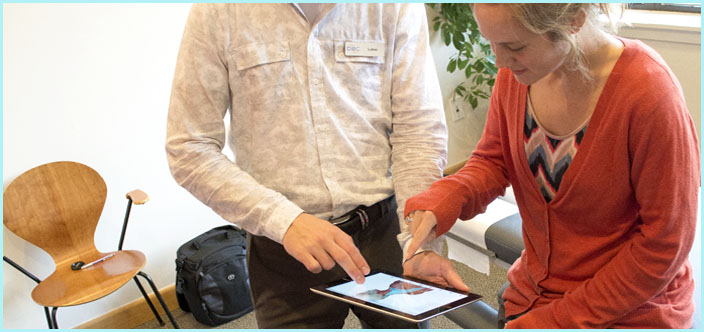Patient Resources

Find out what to expect as a patient.

If you have a question about whether or not Acoustic Compression is the right therapy for your symptoms, or if you have developed a new condition you would like us to work on, please schedule a consult with your DBC doctor by calling us at (616) 940-7027. You can also ask us a general question on our Facebook page to see if a condition is something we treat with Acoustic Compression, though we naturally cannot make a personalized recommendation for treatment there.
Previous or scheduled session
If you have a question for your doctor or technician about your previous or scheduled session, you can feel free to ask them next time you’re in for an appointment and we’ll address them fully. Since Acoustic Compression sessions are most often scheduled approximately one week apart, many basic or non-time sensitive questions can be addressed in this way. Alternatively, you can leave a question for us on our Ask a Doctor line at (616) 940-7027 ext. 3, or post a question for us on our Facebook page, and we’ll get back to you as soon as we can!
Though everyone’s experience with Acoustic Compression is different, here you can learn about the most common ways people respond to AC therapy.
Though we have seen a very high rate of success with Acoustic Compression therapy, the speed with which improvement occurs varies widely with different conditions and between patients. Change may begin nearly immediately, or within a few weeks, and may even occur some weeks or even months after treatments are complete! In fact, it is most common for very chronic or degenerative conditions to show a dramatic turnaround about three months after starting therapy – even when a course of treatment stopped some time before then. More recent or acute injuries typically begin to improve within a few weeks.
With most conditions, you may begin to feel better for several days after a treatment, only to return to where you were before. This is very common, and a good sign of progress! Caution should be taken, however, to not over-stress areas during this period, as they may become aggravated by too much use before change becomes more stable. It is also common for pain or discomfort to ‘move around’ after treatment; often this shows that your body has been compensating for your condition in some way (i.e, by favoring a hip if the other is injured, by avoiding use of an injured shoulder and its associated muscles, etc.) and is having to re-adapt to a greater range of function. Be sure to bring up any such changes with your Acoustic Compression technician so they can adapt treatment to your individual needs!
If you’re already a patient with one of our doctors at DBC, no additional paperwork is needed! Just schedule a consultation with your doctor to ask if Acoustic Compression is right for your condition. Fill out our New Patient form and we’ll give you a call to schedule your first appointments!

One of the great advantages of Acoustic Compression therapy is its relative lack of side effects. However, it is not uncommon for treatment areas with old scar tissue to become more sore or swollen after about 3-4 treatments. This is a sign the scar tissue is being broken up and removed by your body. A small number of patients may feel some slight fatigue after ACT, due to the energy the body is devoting to healing the treatment area. Most patients find that staying well-hydrated before and after your session minimizes or removes this effect. If you have these or other effects after ACT, be sure to tell your therapist so they can work with you and your individual needs!


